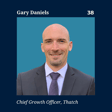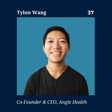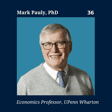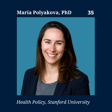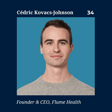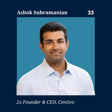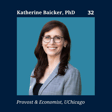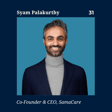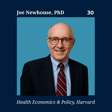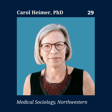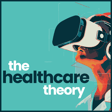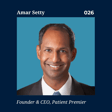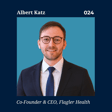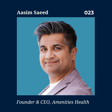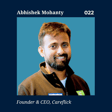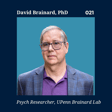Become a Creator today!Start creating today - Share your story with the world!
Start for free
00:00:00
00:00:01

From Oncology to Building for Pharma at YC | Ankr Health CEO Arpit Rao
In this episode, we’re joined by Dr. Arpit Rao, oncologist and co-founder of Ankr Health, a Y Combinator-backed startup using AI to transform cancer care.
We explore his path from running FDA clinical trials to launching a platform that predicts treatment-limiting side effects before they happen. He also discusses the startup’s go-to-market journey, including their first major deal with AstraZeneca, and how they’ve built a solution tailored specifically for the pharma industry. This conversation is a powerful look into how machine learning can improve outcomes, reduce patient drop-off, and reimagine the future of oncology care.
Transcript
Introduction to the Podcast and Guest
00:00:00
Speaker
Welcome to the Healthcare Theory Podcast. I'm your host, Nikhil Reddy, and every week we interview the entrepreneurs and thought leaders behind the future of healthcare care to see what's gone wrong with our system and how we can fix it.
00:00:14
Speaker
Today we're speaking with Arpit Rao, who's an award-winning oncologist who's now the CEO of Anchor Health, which is a Y Combinator-backed startup that's using AI to accelerate and help clinical trials and practices. So hi, Arpit. Thank you so much for coming on today, and welcome to the Healthcare care Theory.
00:00:30
Speaker
Hey, Miguel, thanks for having me on. Of course. And I'm super excited. I mean, you have a bit of an untraditional background. You worked on oncology and worked on like FDA clinical trials for like PRP inhibitors for metastatic cancer. That's not a usual background that we see on the healthcare theory. And that's super exciting. We'd love to hear like what kind of brought you into healthcare and um what's your background?
Arpit Rao's Journey from Tech to Oncology
00:00:53
Speaker
Yeah, I think it just stems from the fact that I love working on new things. And so it's funny the the first company that i ever founded was when i was a medical student and it was a pure tech play and so you know like shopify right shopify is basically a free website and then shopify makes money on all the value-added services so we did something like that in 2008 for college events so we'd go to these large you know college event organizers and say hey guys you have a sucky website can we rebuild this for you and in return we just
00:01:29
Speaker
keep all the ad and marketing rights. And they didn't realize how lucrative that whole proposition was for us. So we'd give them a really nice, piffy website.
00:01:40
Speaker
And that actually got me got me through my med school and then some. But that that was my first foray into entrepreneurship and bringing new ideas, new products in into high demand areas.
00:01:53
Speaker
And then over the years have built a company that we successfully exited that connected experts in the US, s medical experts in the US s with high net worth individuals across the globe.
00:02:07
Speaker
So medical second opinion, Delhi health back in 2014, when, you know, really that wasn't, that was just way out of norm um back then. So we we built that successfully scaled that up and sold it.
00:02:19
Speaker
And then and went back into academia um and started working on getting new drugs to market, that was always kind of an interesting challenge because in oncology, i was at the right place at the right time.
The Evolution and Challenges in Oncology
00:02:34
Speaker
You know, there's been an explosion of new research new drugs, new therapeutic approaches in oncology over the last 20 years. It's completely changed how we look at cancer as a diagnosis, cancer as a disease, and it it has completely changed how we treat a person with cancer.
00:02:55
Speaker
And so I wanted to be at the forefront of that. I wanted to be the person who would take a drug that had only worked in mice, and be the first person to give that to an actual human being.
00:03:08
Speaker
So I loved the idea of doing phase one research. I did formal training in that. And then I started engaging with, um you name it, all the big pharma companies and and NCI. And I was, I got really, I was fortunate. i had great mentors.
00:03:22
Speaker
So was able to participate in getting five FDA approvals over a four-year time span. um And some of these drugs have completely changed how we treat ah prostate cancer, bladder cancer, kidney cancer.
00:03:36
Speaker
So as I was doing that, you know, when you when you're a clinician who just putting back the curtains a little bit on how this process works, it takes about 10 years for a drug to go from um compound of interest to getting through all the ple preclinical work.
00:03:57
Speaker
So mice, pigs, whatever it may be, right? It takes about 10 years for that drug to be ready for a first in human studies. And from first in human studies, it takes about eight to 10 years, again, to get that drug FDA approved.
00:04:11
Speaker
So I came in about four, you know, these these drugs that I talked about, the FDA approvals, they took about five years. so I had a pretty good insight into every step of that process for many of these drugs.
00:04:24
Speaker
And so what happens is, as you as you're looking at these data coming in from phase three studies, and you know that this drug is going to get after FDA approval, you start talking to not just the medical affairs teams, but you start talking to the commercial teams because they they want to have a good idea of, okay, when the FDA looks at this drug and looks at all the research that we're putting together, what's the FDA going to say?
00:04:51
Speaker
Is it going to say, hey, give this drug or this drug is approved for all men with prostate cancer between ages X, Y, and Z for these mutations? Okay. in combination with this another drug, how is the FDA approval going to look like?
00:05:06
Speaker
And that is done about a year before the FDA approval starts, FDA approval occurs. So for that whole year, you're dealing with all these commercial folks, the marketing folks, the patient access, the financial, you know the reimbursement consultants. you're You're talking to all of these people, this huge gamut of of expert And so when you get that insight, it opens your mind on on not just the the science. I mean, yes, the drug is really effective. Yes, the drug is a great advance for mankind.
00:05:41
Speaker
But how do you actually put that advance into a real world?
Innovative Solutions in Clinical Trials
00:05:45
Speaker
That's something I was able to learn kind of firsthand in that pole position, so to speak.
00:05:53
Speaker
And i was able to use that insight when we launched Anchor a few years ago. That's really exciting. And I think that, of course, like the FDA trials, the clinical trial process is pretty arduous. You start animal models, and then even the trials, it gets it takes a lot of time from the first human trials, like the PIVOL trial, and then even like waiting on the FDA for like, there's a lot going on with the PDU for dates and all that stuff. So I can imagine it's pretty arduous, but like speaking on Anchor, of course, like the clinical trials process is, hasn't changed as much as you kind of would expect in the past like 20 years, large biotechs and even like the, sorry, small biotechs and the large biopharma companies
00:06:32
Speaker
still aren't as like data-driven as you'd almost expect at the advent of AI. So, I mean, what problems are you seeing in this process, of course, that you were down in the thick of it? um What was really going on that you kind of stuck out with you?
00:06:44
Speaker
Oh, there's so much. I can imagine. So much more and so much better that we could do with the whole clinical research piece. I'm super glad there's ah there's a plethora of companies now that are looking at basically finding solutions for a lot of the biggest challenges that we have.
00:07:03
Speaker
finding the right patients, activating them at the right time, finding the best drug for a given patient, um improving the odds of getting the clinical trials to completion, because that's another big challenge is you may have a great drug and you may have a list of patients you want to put on that drug to get get the clinical trial completed, but you never find them in the right you know at the right time in the right moment.
00:07:26
Speaker
So there's a lot of companies that are working on these solutions. What we ended up settling on is we said, And this was actually part of one of the conversations that I had. I was sitting in a commercial advisory board for a drug that was going to come to market. And and this um they had experts from all over the globe that had been involved in that study, some who had who weren't involved in the study.
00:07:50
Speaker
And the commercial leaders and you know some of the senior executives from the pharma, they were all sitting in this big, beautiful conference room in New York. And I remember asking you know we were going over every aspect of the FDA submission and what what the approval is going to look like, what the market's saying, what is the patient story going to be, every little bit, right, through through the two-day sessions.
00:08:17
Speaker
And I asked them a question. i was like, guys, can we take a step back? this This research study that's going to result in the FDA approval, FDA label,
00:08:32
Speaker
There is 16% treatment discontinuation rate because of side effects in this study. Meaning one in six patients, give or take, is going to stop your drug because of side effects.
00:08:51
Speaker
So I'm going to do some back of the napkin math. And I'm going to say, since you guys told me this drug is going to sell about a billion and a half a year, back of the napkin, 16% of that. is a couple hundred, 300 million.
00:09:04
Speaker
Why, if you're gonna, there's a revenue side of this, right? the The simplest language is what most people understand, the money, right? So how come you're leaving $300 million dollars on the table every year for this drug that you've spent, again, 15 years getting to this point, and you only have 10 years left before this drug goes off patent?
00:09:26
Speaker
How about, you know, that's $3 billion dollars you're gonna leave on the table, why? And so they, I remember their confused faces. And I remember i was the only person who ever asked that question. And they said, you know, Dr. Rao, there's not too much we can do about it. I mean, we've got patient support. We've got, you know, they gave me a couple of generic answers. i and And I was like,
00:09:47
Speaker
You got to be able to do better than this. I mean, most of these side effects that the people are stopping these life-saving treatments from, this treatment is going to change how cancer X is treated.
00:09:59
Speaker
Guys, like, take a step back. One in six people is going to stop it from something that I think could actually be preventable. And they said, yeah, but we don't actually have a good way of predicting who's going to fall sick. and And how do you even support them?
00:10:15
Speaker
You know, because we're pharma. we don't we We don't have emergency rooms. We don't have a big support system. We have a line that the patient can call and talk to a nurse. And that works sometimes. And I said, yeah, I mean, it's obviously not that used.
00:10:31
Speaker
But that was the genesis of saying, This is a problem for big pharma and 2 million Americans who start cancer treatments every year in the United States.
00:10:42
Speaker
This is a real problem for them. 10 to 20% of those patients stop their life-saving treatment from preventable side effects. How do you stop that? How do you fix that, right? How do you predict who's going to fall sick? How do you support that person at the right time?
00:10:58
Speaker
That was the origin story for Anchor. Yeah, and that's really interesting. and I love that story that you brought up really walking us through it, because you'd think that it happens a lot more than you'd expect. Like, the phase one trials, looking for, like, significant and adverse events, like, you'd think that's a filter process that would get rid of, like, drugs, a lot of side effects, but it's not as effective as we think, and just because, like...
00:11:21
Speaker
It's really ah it's really difficult. Right. And um we've previously had a couple of guests on this podcast, like being able to use AI to like kind of help with like rare diseases. But you're in a different space like working on oncology, which is, of course, like probably has the most sending at spending out of any therapeutic area.
00:11:37
Speaker
um Super widely covered, affects a lot of people, a lot of different indications where It's like a never ending problem
AI and Patient Support in Anchor Health
00:11:43
Speaker
almost. And we'd love to hear, like how does Anchor Health like fit into this picture? like what is Can you give us the elevator pitch and what are you guys working on today?
00:11:51
Speaker
Yeah. So what we we ended up building is a turnkey patient support solution for big pharma. So... we were able to get an open source foundational machine learning model called GSM.
00:12:09
Speaker
This model is really interesting because it it can take list of drugs and a list of side effects and it can draw relationships between them. So it can predict side effects for a given drug at given points in time, but it can also predict Side effects for other side effects. So a great example of this is there's a medication called Zolota.
00:12:33
Speaker
Zolota prescribed, is the most commonly prescribed ah chemotherapy for GI cancers, cancers of the gut. And so if you are a patient on Zolota and if you have a mouth sore, your risk of nausea and diarrhea goes up by five to 10 times, 500 to increase in risk.
00:12:55
Speaker
This GSEM model is actually able to predict that. So we took this open source, scientifically validated, robust model, GSEM, and we pumped it choked full of proprietary data sets and made it into a proprietary GSEM-4 model.
00:13:17
Speaker
This model does a really great job at figuring out which patient's going to have what side effect in the next 48 hours. you imagine?
00:13:28
Speaker
So now you go from this six page information sheet that the patient patients used to get. These are all the things that could happen to you at some point in the next six months.
00:13:40
Speaker
You go from that, the status quo, to a model that can predict, Mr. Jones, these are the three things that you're at risk for in the next 48 hours.
00:13:53
Speaker
right? That's prediction that actually matters. Yeah. So once we had that figured out, once we had the problem statement figured out, and then this G-SIM model, we took our G-SIM-4, we actually tested it in real world. So we had clinical validation on a cohort of about 1,500 patients and East Coast to West Coast, really big validation.
00:14:17
Speaker
And it it worked. Our predictive model, which again, proprietary, foundational machine learning model in oncology was able to keep patients on treatment for an extra couple of months.
00:14:33
Speaker
Yeah. You go from, okay, this was a non-solvable problem to, okay, what is the value if we could keep your patients on treatment for two extra months?
00:14:45
Speaker
Of course, it's good for the patient because it's life-saving treatment for the patient. It's also good for the patient because they're getting fewer side effects. It's not magic. Our model predicts who's going to fall sick.
00:14:57
Speaker
It gives them advance warning. It gives them support when the patient's less sick so they don't become more sick and stop treatment. So it's helping the patient, obviously, right? It's helping them do better, live longer.
00:15:12
Speaker
But for pharma, there's an obvious conversion of that two extra months of treatment into two extra months of revenue. Right. So that was the the second aha moment in in Anchor's history, as I call it, is is saying that this is great for the health care systems, but it's even better for big pharma.
00:15:34
Speaker
Because those are the ones that are hurting the most with the fewest options. And that may be kind of the only time on your podcast, Nikhil, that anybody's going to say big pharma is hurting. But that may be like the one place where they were really hurting.
00:15:49
Speaker
Yeah, of course. And I think I really love how you're able to like actually create like real r ROI for these pharma companies, which means that the money they're saving can like be, I mean, of course, like can be used to spend on your product. You guys will do great from a business standpoint, but of course, like for the patients, they're benefiting all the same, which is like amazing. But it seems like you guys had this great open source model. And what's really unique, and I love the way you guys approach this, was getting like good, high quality proprietary data because a model is only as good as this data are really and what it's being trained on.
00:16:19
Speaker
But I mean, I know you can't force, I guess, proprietary, you can't go into the exact weeds, but at a high level, like how did you approach this? I know you had a bit of background in oncology, but like where did you kind of look? i mean, how did you kind of approach this idea of feeding the model with the right data and making sure that the AI is accurate and like is able to actually kind of help people out?
00:16:38
Speaker
Yeah. So I'll give you you kind of the high level recipe, right? And it's not it's not like the KFC recipe but yeah or a Coke recipe, right? Not locked down in Atlanta.
00:16:51
Speaker
But if you look at the level of evidence in in new drug discovery, level one, the best quality data that is ever generated on a drug is generated in the clinical trials.
00:17:06
Speaker
If you ever get access to clinical trial-grade data, the raw data, That's the best thing you can get. So whenever we could, wherever we could, we spend a lot of time, energy and money on finding that level one data.
00:17:23
Speaker
Level
Data and AI Model Development
00:17:24
Speaker
two data are things where it's coming from the real world. So it's coming from post-approval setting. So that drug or drug in similar class tend to have similar side effects, right?
00:17:39
Speaker
So family, so family of drugs tend to have similar side effects. So if you can get data from the real world where doctors are using it and doctors are capturing their side effects, so-called real world evidence studies, that's a really good source of data ah data too. You just have to be careful about how you QA that data, quality check that data and make sure that that fits your purpose.
00:18:05
Speaker
because there's a risk of overfitting your model with that data. But if you can get that, great. And then another source is when these doctors, they do chart reviews or chart chart abstractions for a certain kind of drug or certain class of patients.
00:18:22
Speaker
And if you can get that raw data from there. um So we used kind of these level one, level two, and then some level three of where we had raw EHR data come back and we had to do a lot of QA, QC on and that data pipeline.
00:18:35
Speaker
But that that was how it was it was done. That makes a lot of sense. It's interesting. You have like level one and different levels of data, which totally makes sense. that Actually, like the clinical trials is probably the best place to get like real directive, like raw data.
00:18:50
Speaker
um And from there, I mean, it's clear like what your kind of business model would be. I mean, selling to big pharma companies so that the solution can like help monitor side effects at like really no end cost to end patient.
Navigating Sales to Big Pharma
00:19:01
Speaker
um But I mean, for you guys, like ah this is not a very easy task. Like big pharma companies are huge, have huge sales cycles. Like, how'd you kind of go about this sales process? Like what, cause I know you guys like started off quite a few years ago and you've been scaling up a lot since then. Like, how has that kind of been so far? Yeah.
00:19:17
Speaker
yeah So we're a YC company. So we got a unicorn or bust, right? and first out But so we didn't find a way where we could charge the individual patient the kind of money that we thought was reasonable given the ah ROI that we were bringing.
00:19:36
Speaker
ah It was just not ethical to charge patient that money. Definitely. um It was going to be unaffordable for majority of Americans. So we, that was a no go, even though we, I would have probably raised five times as much money if I had just said, Hey, we're a D2C company.
00:19:53
Speaker
I literally had investors shut the door on my face because we weren't D2C. We were going the harder part selling to businesses. And, um and so, Patience was a no-go.
00:20:05
Speaker
Pharma had a clear 4 to 5. We thought that pharma had a clear 4 to 5x ROI where we could actually be a unicorn and still deliver 5x more value to our pharma clients. So the sales process for pharma is is really gruesome.
00:20:22
Speaker
And that's why it took about two years from the day we made the decision, hey we're going start working on pharma to getting our first pharma deal. So I made this announcement a couple of months ago, but AstraZeneca signed a major deal with with Anchor um only a ah couple of months ago.
00:20:39
Speaker
And um we our first collaboration is going live with their crown jewel of a drug called Linparza. And so the way we got to that, is by engaging, i mean, it may sound simplistic or reductive, but we actually just happen to be very strategic about finding the people who are going to be responsible for making the biggest um kind of advances in AstraZeneca's pipeline overall, their portfolio, and the and reaching out to those leaders, giving a cohesive argument on why this drug has so much potential, but it's going to fall short.
00:21:19
Speaker
if unless there's more attention paid on patient support, we just happen to have the right story, the right level of evidence, the right leaders at the right time. And so that that that's just it. and And having that persistence, but building up to it, right? Having all those things in place when you go up to that person to have that conversation, that's where kind of majority of the heavy lift was.
00:21:44
Speaker
Once we went there, it was... kind of ah an open space. So if you look at patient support or cancer navigation or ah in general, this bucket of companies, um there isn't there's very few, if any, that are primarily AI driven, VR, right?
00:22:05
Speaker
We're model first and human second. So that was a big differentiator. Because we're model first, we can be proactive rather than reactive, which are most of our competitors.
00:22:16
Speaker
And then most of our competitors went the traditional route. These are huge companies. They've had Like some of them have been acquired for about a billion, whatever, right? they've They've had big exits and they're very successful, but they cater to the other stakeholder, the health systems or the oncology clinics.
00:22:33
Speaker
That's their primary audience. So they're really not designed for the limitations of big pharma or the requirements of big pharma. So we just happen to find this top right quadrant, as they say, of proactive care that's designed for big pharma.
00:22:48
Speaker
And that's a greenfield, wide open space. We still, even though we've come out of stealth only about a year ago, we still have zero competition. The nearest competitor is not even close to being you know proactive or doing any kind of forward-looking project.
00:23:04
Speaker
So the fact that we already have a contract, you know we already have this model clinically validated, that's a pretty big mold. And that's what we're going capitalize on. Yeah, I think you guys fit into a really well ah good niche. cause You'll see like some companies like Sama selling to pharma companies for clinical trials, but they're working more with the data, not really working with the actual like patients. It's more like trial analysis, helping get patients in. Then on the other end of that, like you'll help you'll see people working with patients, but then it'll be at the provider level, completely different. You guys are talking this niche in between, which we know I think is um really exciting. and
00:23:39
Speaker
Of course, it's definitely a good space to be in. Like, it's good that you guys identified that white space. And as you're kind of identified this and are kind of scaling in the future, like what are your like kind of aspirations
Future Plans and Expansion
00:23:50
Speaker
for Anchor Health? Because of course you have that YC credence behind you. And that's like, of course, maybe change your trajectory quite a bit, which is awesome. But where do you see Anchor Health going in the next couple of years?
00:24:01
Speaker
So there's last year FDA approved 60 new drugs in oncology. We want to be bundled with every new FDA approval. that's That's the game plan. um If we can get to majority of Americans who get treatment for cancer, like who get started on treatment for cancer, that's a pretty big win.
00:24:22
Speaker
That alone is about a 2 million people a year market. And then adjacent markets, like some of the best selling drugs, some of the um ah the most high-risk drugs in GI, rheumatology, neurology, you know, these drugs pull in another one to two million patients a year who are at similar high risk of side effects.
00:24:45
Speaker
Those side effects look different than a cancer patient. You know, the MS drug is obviously going to have different set of side effects, may not be as much mouth sores, but it could be immune system complications.
00:24:56
Speaker
You but they end up in the same emergency rooms, right? They end up being similarly stuck with a less effective overall treatment. So... Four million Americans a year is kind of our our target.
00:25:09
Speaker
And then from there, we have plans to go after kind of the underserved, the non-English speaking population um outside of the United States. That's another ah greenfield space.
00:25:21
Speaker
We've already had some discussions. and There's actually a ah two investors that wanted us to start working in two completely new markets, one Chinese and one India market.
00:25:33
Speaker
And so there's all kinds of really interesting opportunity. I mean, these these patients have the same problems no matter which part of the world. It's just we're based here. we want to start here. But that's that's the immediate plan for the next three, four, five years is touch four million American lives.
00:25:49
Speaker
And then from there, um sky's the limit. Of course, and that's super exciting. And I know India is a good opportunity, but China, of course, is a lot of like lead candidates in the biotech oncology space. So that's gonna be super exciting as you guys like are able to bridge off there. And there's one there's one last question I had that I think a lot of us are probably interested to hear is, I mean, you have experience in oncology, you're an MD, you're a doctor, but you've always like maybe had this knack for entrepreneurship um ever since you're kind of building those websites. And That's something that i think a lot of people can relate to, but it's definitely hard. I know you didn't have a traditional background of computer science and kind of found your own path, but maybe what kind of made entrepreneurship like tick so much for you? And then how do you develop that skill set to like work in AI, work in technologies that maybe you didn't study in school, but were still passionate about? We'd love to hear your advice for any entrepreneurs or aspiring high school, college students who are maybe interested in this space going forward.
Advice and Final Thoughts from Arpit Rao
00:26:44
Speaker
Yeah, I've thought about this question more than you'd think, Nicol. So my advice to anybody who's smart, if they're in high school, if they're in college, even if they've already started a job, no matter what specialty you're in I think you got to take out. It doesn't take much time. i mean, it can be can be accomplished in a month or two of real dedicated time, but get get the basics of machine learning, AI, programming, just dive into that realm.
00:27:22
Speaker
Get comfortable with it. Get comfortable with the idea that you can be on your computer and looking at a green and black screen and typing in something, typing in instructions, and for the computer to spit back some output, right?
00:27:36
Speaker
Get used to that idea because what that' that's going to do is it's going to allow you to dream big and not rely on the limitation of finding a technical person.
00:27:52
Speaker
Right. So when you have a great idea, you may be selling cars. mean You're 26, you're selling cars and you're at a Cadillac dealership. But you you're seeing problems around you.
00:28:05
Speaker
And there may be if only if you had the technical skills that you could find a technical solution to that. And that technical solution could actually become a unicorn.
00:28:16
Speaker
Right. Those are kinds of, I mean, if you're a smart high schooler, if a smart college student, you got to get tech savvy. You got to get coding savvy. That's one thing that I did well. I still remember when I was i was a 10-year-old and I had access to this really crappy computer and I had COBOL, a language that's now archaic, running on it. But that's when I started coding.
00:28:42
Speaker
And it was only about eight years later that that coding skill became a business. Right. When I was ah when I was a medical student, and you know, I don't want to say drunk, but yeah. So, you know, so it but that's one thing you can't leave out. Like the world as you know, it will change you guys.
00:29:03
Speaker
Like if you're listening to this podcast, I mean, it's 2025. If this is 2030, 2035. And if somebody finds this ancient copy of this podcast, you already know.
00:29:16
Speaker
that the world has changed around you. The only way to have control is if you have skills that can help you ride the wave instead of getting swallowed by it.
00:29:27
Speaker
So learn coding, get into it. It's gonna take a couple months and then use it for problems you deal with in your life.
00:29:36
Speaker
And that's I think that's something that that is essential. Yeah, of course. And um yeah, I definitely can really hit on that. Like I've still listened to some YC like podcast episodes and they always really harp on the fact that like it's good to have a business co-founder, but it's even better if you know the technicality to explore things yourself and build things yourself and just be like self-reliant. So definitely agree with that. And yeah,
00:29:59
Speaker
Just want to say like this is a very educational podcast. It's awesome to hear like how you guys have pivoted or just like having to develop the solution. So mean, really appreciate your time. And thanks so much for kind of walking us through your story today, Art Pit.
00:30:11
Speaker
um Thanks for coming on. Yeah, thanks for having me. And I hope this this helps somebody. if If you guys want to get in touch, um they go you have my contact information. I'm happy to talk to anybody.
00:30:21
Speaker
ah But thanks again for for giving me the time to to talk about my story.
00:30:29
Speaker
Thanks for listening to The Healthcare Theory.
Podcast Closing Remarks
00:30:32
Speaker
Every Tuesday, expect a new episode on the platform of your choice. You can find us on Spotify, Apple Music, YouTube, any streaming platform you can imagine.
00:30:41
Speaker
We'll also be posting more short-form educational content on Instagram and TikTok. And if you really want to learn more about what's gone wrong with healthcare care and how you can help, check out our blog at thehealthcaretheory.org. Repeat, thehealthcaretheory.org.
00:30:56
Speaker
Again, i appreciate you tuning in and I hope to see you again soon.

